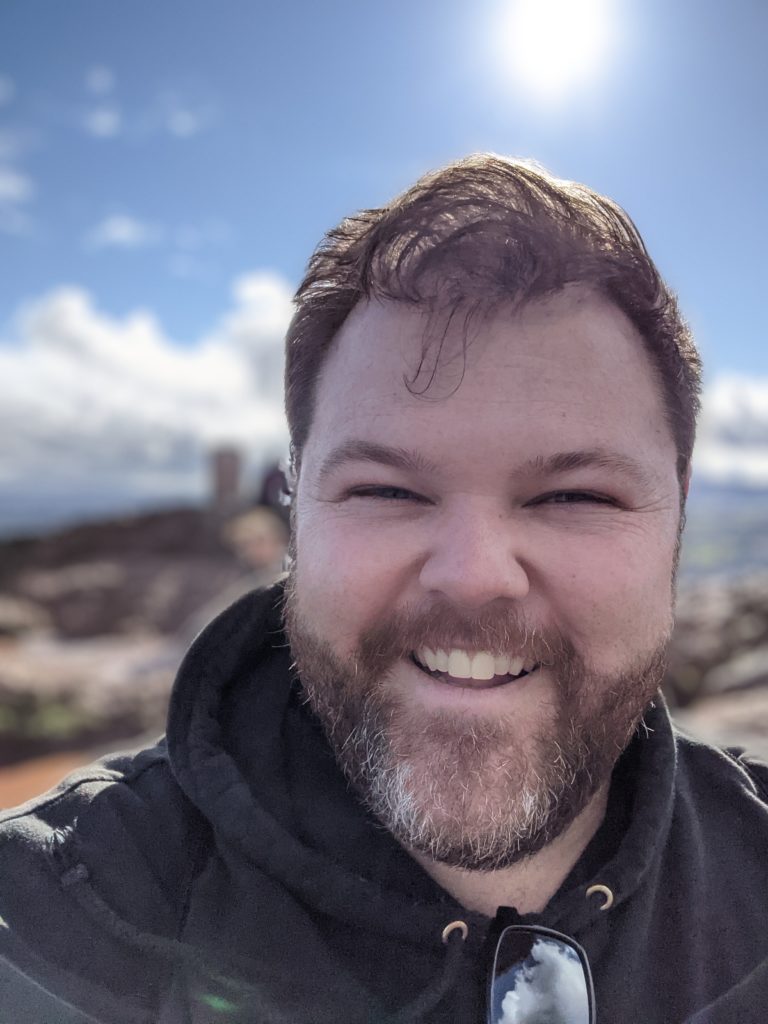
Why did you apply to HASTAC?
Aside from the fact that it’s the best acronym of all time, I applied to HASTAC because my PhD program is interdisciplinary and a half. My list of academic and personal interests has skyrocketed over the last few years, and HASTAC seems to be a never-ending source of interesting ideas and truly awesome applications.
What has been your favorite course so far as an instructor or student? Why?
I built a directed research course for the 2020–2021 academic year that ended up being the coolest thing I’ve ever done. Alongside a professor and another student from my program (HASTAC Scholar Kelsey Dufresne), I created a 3D-printed touch interface that “knows” when it’s being touched and responds to the amount of input it receives by remediating the text of Mary Shelley’s Frankenstein into phrases, poems, and the like. That description isn’t doing it justice, but here’s a cool picture of the prototype (which I call Frankenstein Touch):

What do you want to do after you graduate?
Sleep and spend time outside, ideally simultaneously. I’ve really loved my PhD program, but it’s all-enveloping in so many ways that a good, long decompressing is in order. After that, a job would be nice.
What’s something that people would be surprised to know about you?
I’m an award-winning, internationally published literary translator. My translation of Portuguese poet João Luís Barreto Guimarães’s ninth book, Mediterranean, is on its way into the world later this year, and I’ve got another secret project that should follow it relatively closely.
What are some things that you wish you knew before you got into graduate school?
The main thing I wish I knew was how to translate what I am working on into publishable material. It’s not something I had to do in either of my master’s programs, and it definitely doesn’t come naturally to me. I really enjoy presenting at academic conferences, because it gives me the chance to bounce my ideas off scholars who can help me make it better, but taking the next step of fleshing out an idea and infusing it with argument and that ever-elusive “so what” factor has yet to get easier for me.
How do you envision HASTAC and/or higher education in 10 years? Where do you fit in?
All I’d really venture right now in terms of HASTAC is that I envision it as bigger and better. It brings such fantastic cross-pollination to the table, and it’s important to continue developing organizations who do that type of work. Higher education’s future is a doozie. Adaptation is going to be key, and if we can continue the trends of public-facing and open-access work I think things will work out.
How does digital scholarship fit into your research or teaching?
I chose my PhD program because of its connections to digital scholarship. My dissertation focus is on the interstices between electronic literature and digital humanities, so digital scholarship is integral to what I’m trying to accomplish. I’m also working to maintain a strong connection to media/material studies, since I think there’s still a ton to learn from “analog” things. I like to think and teach about remediation, so the overlap(s) between the digital and the physical are right up my alley.
What do you hope to accomplish with your research or teaching?
With my research, I hope to convince at least a few people to read creative works and recognize how the ideas in them map onto the “real” world (if there is such a thing). For example, I’ve done a ton of work with Frankenstein to the point that I don’t see anything as one single thing. Everything is made up of individual pieces that somehow function as a whole—computers, words, societies—and, to me, at least, it’s the individual components that fascinate. With my teaching, I ask students to focus on those individual components, and my ultimate goal is to get them to see through the way things appear to decipher why they appear that way and how they might be reconfigured to make things—a paper, a poem, a policy, etc.—better.
What are you currently reading, watching, or listening to?
I just finished reading The New College Classroom by Cathy N. Davidson and Christina Katopodis, and as soon as I finished I finally cracked open Stephen King’s On Writing. I’m watching a lot of Abbott Elementary these days. And lately I only listen to three things: (1) this white noise video when I’m writing, (2) my beloved PTI podcast because old guys yelling at each other about sports is funny, and (3) music by Carter Vail.
What’s something we should ask you? What’s your answer?
You should ask me the best advice I received while in grad school. My answer would be that someone told me to never work through lunch. Find a nice place to sit, leave your work alone, and just eat.